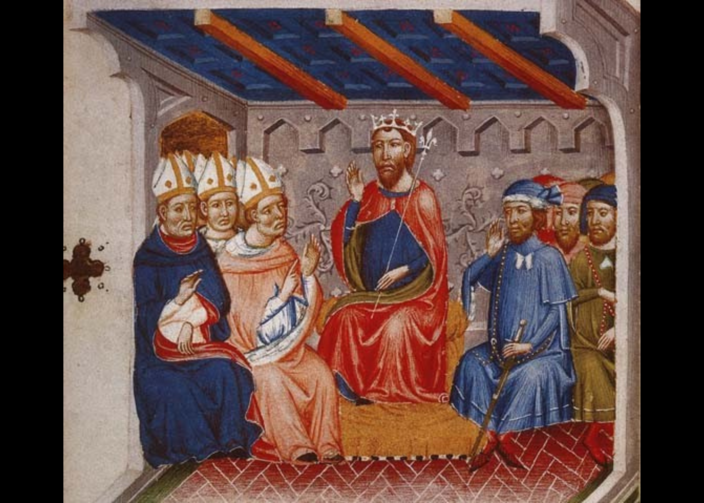A Homily for the Solemnity of the Ascension of the Lord
Readings: Acts 1:1-11 Ephesians 1:17-23 Mark 16:15-20
In 1263, King James I of Aragon ordered a public disputation between Christians and Jews: Was Jesus of Nazareth Israel’s promised Messiah? When a medieval king commanded such a debate, who could refuse the summons? And who would expect a fair exchange of ideas?
The Disputation of Barcelona took place in the presence of the king and his court as well as many invited ecclesiastical dignitaries. Leading the Christians was a convert from Judaism turned Dominican friar, Pablo Christiani. The respondent was the Jewish scholar Nachmanides (1194-1270), a philosopher, physician, kabbalist and biblical commentator.
Christiani had assured the king that he could prove the truth of Christianity by citing early Jewish sources. Compelled to debate, Nachmanides asked only to enjoy freedom of speech.
Using quotations from the Talmud, the central text of Rabbinic Judaism, Christiani argued that the pharisaic contemporaries of Jesus believed him to be the Messiah. Nachmanides responded that these were distorted readings of the rabbis. And in what might be called the case for the defense, he raised a question that Christians can only ignore at their peril: If Jesus is the promised Messiah, why is the world unchanged in his wake?
The messianic age promised by Israel’s prophets was supposed to be a time of peace, a reign of universal justice. But in the time since the appearance of Christ, as Nachmanides pointed out, the world has been filled with war and injustice, so much of it perpetrated by Christians themselves.
Nachmanides’s defense is worth pondering on the Solemnity of the Ascension. As preachers will once again insist, the Ascension is not a celebration of Christ’s taking leave of us, his departure for heaven. No, we acclaim his entry into glory, his being seated at the right hand of the Father. St. Paul told the Ephesians that God had exercised a “great might,” which he worked in Christ,
raising him from the dead
seating him at his right hand in the heavens,
far above every principality, authority, power, and dominion,
and every name that is named,
not only in this age but also in the one to come (1:20-21).
Christians may correctly claim that the Messiah had to be identified with Isaiah’s Suffering Servant, that our Lord had to suffer and die. But in the wake of his resurrection and ascension, as we say in the psalm chosen for this feast,
God mounts his throne amid shouts of joy;
the Lord, amid trumpet blasts (Ps 47:6).
This raises the question, which Nachmanides posed: If Christ has been enthroned in power, why is the world still unchanged?
It is a valid objection. Christians cannot have it both ways. If God the Father has exalted his Christ and made all things subject to him, then where is the peace and justice that was promised?
Of course, Christians have always responded by speaking of a promise fulfilled but not yet delivered: The Messiah has come; his reign is coming. But that throws the outcome of King James’s contest into the court of history. The years to follow will either prove or disprove the Christian confession that the Messiah has come.
But one thing is certain. Christians cannot live in the world without regard for peace and justice, as though the kingdom will come despite our negligence, in another world untouched by our own. If contemporary Christians do not make the world a better place than we find it, if we are not at the forefront of the world’s growth and transformation, why should anyone take seriously our acclamation that Jesus is the Messiah, that “the king of all the earth is God?” (Ps 47:8)
At the close of the Barcelona disputation, King James awarded Nachmanides a prize of three hundred gold coins, declaring that he had never heard “an unjust cause so nobly defended.” And on the Sabbath following the debate, his majesty attended the Sinagoga Major de Barcelona, one of the oldest in Europe. It is as though this most Christian king believed he had something to learn from those outside the faith. Do we believe it as well?








